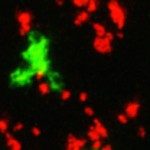Link to Pubmed [PMID] – 18354207
J. Immunol. 2008 Apr;180(7):4836-47
Early during infection, CMV targets dendritic cells (DC) and alters their functions. Herein we show that CMV-infected DC maintain the ability to present both virus-derived and exogenous Ags, but that they actively induce tolerance or anergy in Ag-specific T cells. CMV accomplishes this by selectively maintaining high-level expression of the negative costimulatory molecule programmed death ligand-1 (PD-L1), while commensurately down-regulating positive costimulatory molecules and MHC on the DC surface. Consequently, CD4 and CD8 T cells activated by these infected DC have a stunted phenotype, characterized by poor proliferation, effector function. and recall responses. Blocking PD-L1, but not PD-L2, during direct priming of naive T cells by infected DC significantly restores Ag-specific T cell functions. Using systems where direct and cross-priming of T cells can be distinguished revealed that PD-L1/PD-1 signaling contributes only when naive T cells are primed directly by infected DC, and not upon cross-presentation of viral Ags by uninfected DC. These data suggest that murine CMV programs infected DC during acute infection to inhibit early host adaptive antiviral responses by tipping the balance between negative and positive cosignals.

